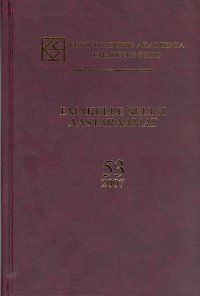Kaitseväelase kutsevalikut põhjendavad argumendid
Arguments explaining the servicemen’s choice of profession
Author(s): Karen KuldnokkSubject(s): Language and Literature Studies
Published by: Teaduste Akadeemia Kirjastus
Keywords: text analysis; argumentation; deixis
Summary/Abstract: This article analyses argumentation in essays written by the cadets of the Estonian National Defence College. The article refl ects on the process of argumentation in terms of content and form. On one hand, the type and choice of language the authors use for expressing their ideas on explaining their choice of profession are under investigation. On the other hand, the article analyses the positions the authors take to express their opinions and how they try to add credibility to their arguments. The object of analysis is 26 essays. The arguments supporting the choice of profession are divided into three groups: arguments based on values of society and mythological ideals, aguments based on the character of the work, and arguments based on personal profi t. Arguments based on values of society are noble, originating from higher interests, interests of homeland and state, as well as the well-being of relatives; personal interests are mentioned less often. The main arguments people use for justifying their choice of profession are: love for their homeland, a calling for their work, internal motivation to make their personal contribution to the development of the Defence Forces of Estonia. Also, the fact that today’s society considers the offi cer’s profession manly and honourable plays its part in the choice of profession. Other arguments mentioned are the „primordial call” for the profession and the desire to be on the side of the winners and do great deeds. Arguments based on the character of the work emphasise that the job is interesting, full of variety, creative and full of challenges. Arguments originating from personal profi t are not considered to be primary. The most important of them are: economic independence, a good income, a safe future, a permanent position and social guarantees. People do perceive the dif- fi culties accompanying the offi cer’s profession, namely great responsibility and high expectations, but even those are seen in a positive light. Credibility is added to the arguments by various rhetorical devices: confi dent statement, modals (certainly, of course, always) and quoting authority fi gures. Generalisation is mostly used for expressing the argument. On one hand, generalisation is caused by the topic and genre, but it is also a sign of the sense of belonging to the group. Cadets talk about themselves as the representatives of servicemen, not as singular people in the role of the offi cer. An I-position is used while talking about personal experiences, wishing to contrast their own opinion to a possible opposing opinion. The us-position signifi es mostly the state of Estonia and Estonians.
Journal: Emakeele Seltsi aastaraamat
- Issue Year: 2007
- Issue No: 53
- Page Range: 064-086
- Page Count: 23
- Language: Estonian

